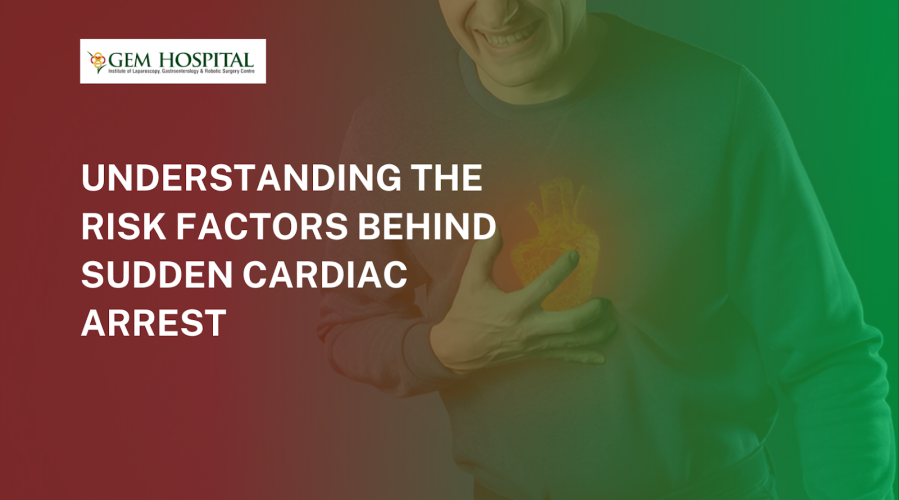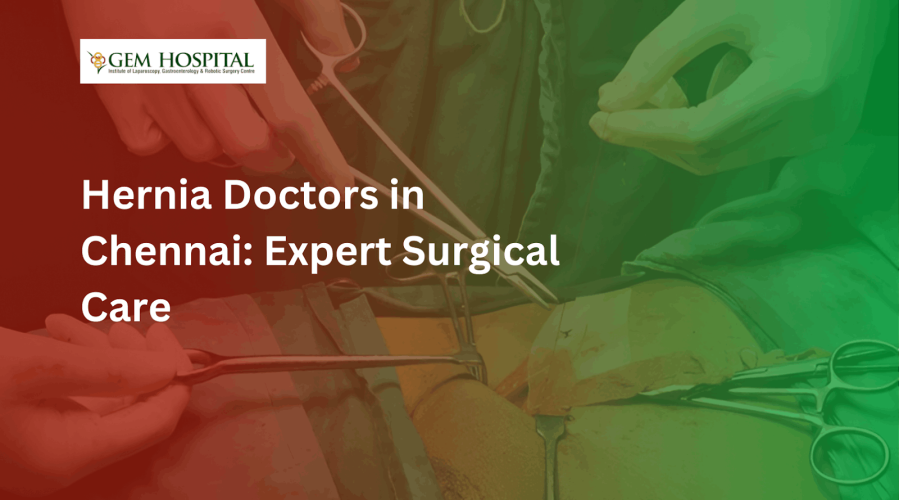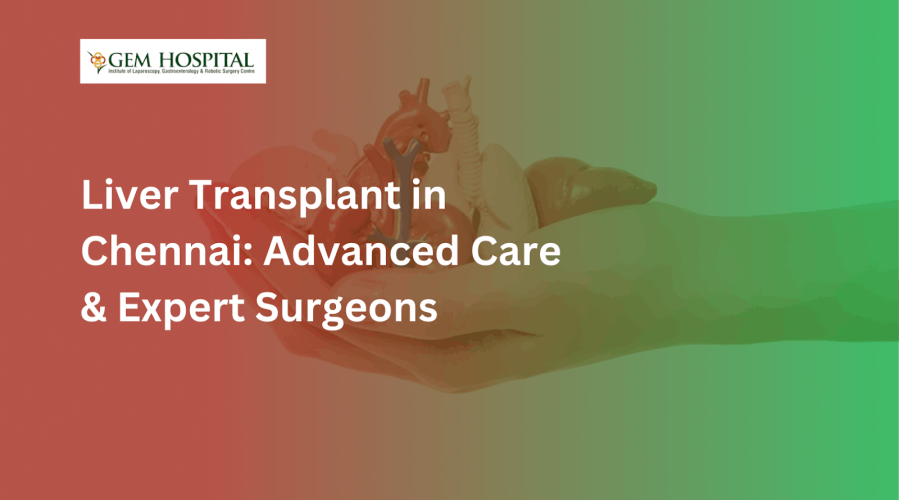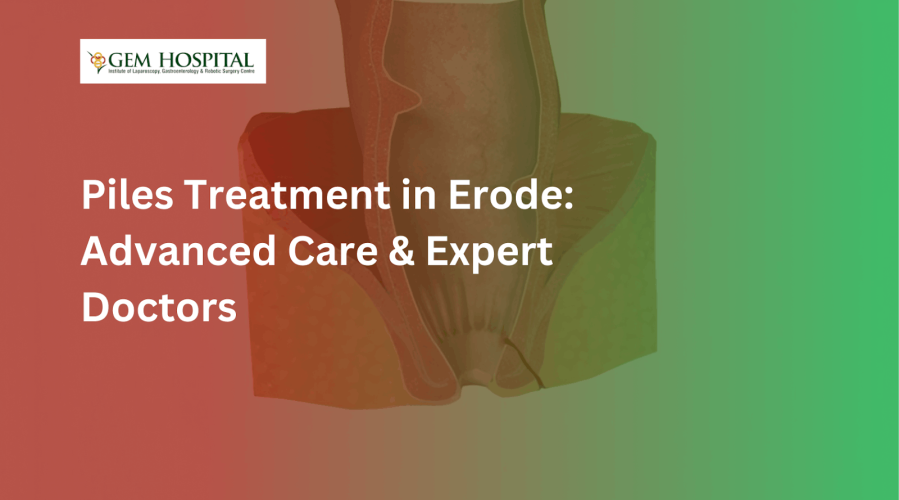Consult experienced hernia doctors in Chennai for expert surgical care. Advanced diagnosis, safe hernia surgery, and faster recovery with specialized treatment.
Understanding the Risk Factors Behind Sudden Cardiac Arrest

Sudden Cardiac Arrest (SCA) occurs suddenly without warning or opportunity to react. While heart attack is caused by a blockage that cuts blood flow, SCA is an electrical malfunction that causes the heart to stop beating all together. This can happen to anyone, young or old and healthy or unhealthy, and is one of the primary components of unexpected death globally.
Understanding the risk factors that may lead to SCA is critical to prevention. Let's look at the key factors that help trigger Sudden Cardiac Arrest and what you can do to protect yourself or your loved ones.
What is Sudden Cardiac Arrest?
Before we look at the Sudden Cardiac Arrest risk factors, it is important to examine what Sudden Cardiac Arrest really is. Sudden Cardiac Arrest is considered an irregular heartbeat (arrhythmia). The arrhythmia is often ventricular fibrillation. This prevents the heart from pumping blood to the brain or the rest of the body. Within seconds of the heart not pumping blood, the person becomes unconscious and if treatment is not received, they can die within minutes.
SCA is not the same as heart attack, although heart attack can trigger SCA. That’s why even people who have recovered from a heart attack remain at high risk for SCA.
Top Sudden Cardiac Arrest Risk Factors
1. Coronary Artery Disease (CAD)
The most common cause of sudden cardiac arrest according to studies. CAD is narrowing of the arteries due to cholesterol buildup or decreased blood flow to the heart. Those with heart disease (CAD) often have previous damage to the heart, making them much more susceptible to sudden cardiac arrest.
2. Previous Heart Attack or Cardiac Event
Individuals who have previously had heart issues are more likely to have an SCA event. SGHE states the risk is highest in the first six months following a heart attack.
3. Heart Failure
When the heart's pumping capacity is impaired (also referred to as left ventricular dysfunction), your chances of sudden cardiac arrest dramatically increase. Specifically, people with an ejection fraction (EF) of less than 35% are at risk.
4. Genetic Heart Conditions
Some rare hereditary heart disorders, such as Long QT syndrome, Brugada syndrome, or genetic forms of hypertrophic cardiomyopathy can disrupt the heart's rhythm. Most of the time, these individuals are unaware of their condition until a cardiac event occurs.
5. Electrical Abnormalities
Other abnormalities as basic as an arrhythmia, like ventricular tachycardia, or ventricular fibrillation, can immediately lead to cardiac arrest; arrhythmias are treated with medication and/or implanted devices such as a defibrillator..
6. Lifestyle-Related Factors
Having unhealthy habits such as smoking, poor diet, sedentary lifestyle, and excessive alcohol can contribute to heart disease and increase risk for sudden cardiac arrest.
7. High Blood Pressure and High Cholesterol
High blood pressure and high cholesterol damage arteries and overload the heart. The cumulative effects of years of overstress on the heart can lead to problems with the heart's rhythm and cause heart attacks.
8. Diabetes
Diabetes is closely associated with heart disease. High sugar levels damage blood vessels and nerves that control the heart, which can lead to increased risk for heart attack and SCA.
9. Obesity
Excess weight leads to high cholesterol, high blood pressure, and diabetes, which can complicate heart-related issues.
10. Lack of Regular Screening
Many risk factors remain unidentified simply because individuals do not seek regular health checks. Identifying heart problems early is a key step in preventing heart issues.
Warning Signs to Watch Out For
SCA often occurs with little to no warning, but some individuals may experience symptoms like:
- Chest pain or discomfort
- Shortness of breath
- Heart palpitations
- Dizziness or fainting spells
- Unexplained fatigue
These signs should never be ignored, especially if you have known heart conditions or any of the Sudden Cardiac Arrest risk factors mentioned above.
Prevention and Proactive Measures
- Regular cardiac checkups: Particularly important if you have family history or other risk factors.
- Lifestyle modifications: Quit smoking, eat heart-healthy food, stay active, and maintain a healthy weight.
- Manage chronic conditions: Keep blood pressure, diabetes, and cholesterol under control.
- Medication compliance: Take prescribed medications regularly and don’t self-adjust doses.
- Know your numbers: Track your heart rate, blood pressure, and sugar levels.
- Consider cardiac screening tests: ECG, echocardiogram, or stress tests can reveal abnormalities early.
Emergency Response Saves Lives
If someone collapses suddenly and is unresponsive:
- Call for emergency medical help.
- Start CPR immediately.
- Use an AED (Automated External Defibrillator) if available every minute counts.
Immediate action can double or even triple the chance of survival.
Protect Your Heart, Preserve Your Life
Sudden Cardiac Arrest can happen to anyone, but it doesn't have to be sudden. With optimal awareness and proactive heart health, you can make your risk dramatically lower. If you or someone you love qualifies for any of the Sudden Cardiac Arrest risk factors discussed previously, it's time to take action!
At GEM Hospital, our experienced cardiologists and diagnostics team perform your complete cardiac evaluation, lifestyle management, and personalized treatment. Don't wait until you are symptomatic.
Schedule your appointment with GEM Hospital today and take the first step in proactively looking after your heart health.
Blogs & Article
Get advanced liver transplant treatment in Chennai with expert surgeons, modern technology, and comprehensive care for safe and successful outcomes.
Get advanced piles treatment in Erode with expert doctors. Safe procedures, modern technology, and effective care for fast relief and recovery.


